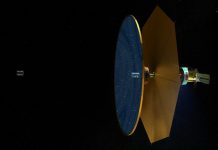
For the first time in nearly 30 years of observations, Neptune’s cloud cover has dramatically decreased, and researchers think the sun’s solar cycle might be the reason.
This is surprising given Neptune’s enormous distance from the sun.
A Mystery Unfolds in Neptune’s Skies
Researchers from the University of California, Berkeley, and Harvard University’s Center for Astrophysics noticed the drastic reduction in Neptune’s cloud cover from 2019 onwards.
These findings are based on nearly three decades of images captured through the W. M. Keck Observatory in Hawaii and NASA’s Hubble Space Telescope.
“I was surprised by how quickly clouds disappeared on Neptune,” said Imke de Pater, emeritus professor of astronomy at UC Berkeley.
The Solar Connection
One of the most surprising aspects of this observation is the discovered link between Neptune’s disappearing clouds and the solar cycle—a periodic 11-year reversal of the sun’s magnetic field affecting solar radiation levels.
Given that Neptune is the farthest major planet from the sun and receives only a fraction of its sunlight, this is an intriguing find.
“The remarkable data give us the strongest evidence yet that Neptune’s cloud cover correlates with the sun’s cycle,” said de Pater.
A Complex Correlation
Although a connection between Neptune’s cloud activity and the solar cycle has been established, the complexity of factors involved makes it a challenging puzzle.
The study notes that while increased UV sunlight could lead to more clouds, it could also darken them.
Additionally, storms that are unrelated to photochemically-produced clouds might affect cloud cover and complicate the solar cycle correlation.
Importance of Continued Observation
It’s clear that more work is needed to fully understand this phenomenon.
Ongoing observations from the James Webb Space Telescope (JWST) and the Keck Observatory are expected to shed more light on Neptune’s atmospheric behavior, possibly deepening our understanding of not only Neptune but also of exoplanets.
“It’s fascinating to be able to use telescopes on Earth to study the climate of a world more than 2.5 billion miles away from us,” said Carlos Alvarez, a staff astronomer at Keck Observatory.
Future Implications
The implications of this discovery are not confined to Neptune; they also shed light on how solar activity might affect other planets in our solar system and beyond.
As technology continues to evolve, these findings may well serve as a cornerstone for understanding planetary atmospheres in a broader cosmic context.
In summary, the study, published in the journal Icarus, opens up exciting new avenues for understanding the intricacies of planetary atmospheres and their relationship with solar activity.
The study was published in Icarus.
Source: W. M. Keck Observatory



